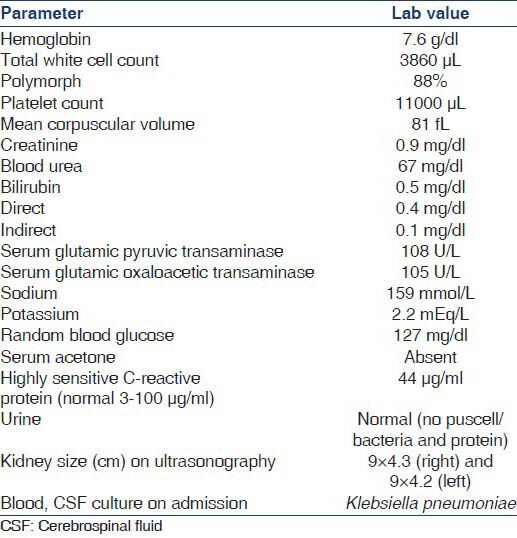Translate this page into:
Successful renal transplantation from a deceased donor who died of bacterial meningitis
This is an open-access article distributed under the terms of the Creative Commons Attribution-Noncommercial-Share Alike 3.0 Unported, which permits unrestricted use, distribution, and reproduction in any medium, provided the original work is properly cited.
This article was originally published by Medknow Publications & Media Pvt Ltd and was migrated to Scientific Scholar after the change of Publisher.
Sir,
An infectious cause of donor death is often considered an absolute contraindication to deceased donor organ transplantation due to fear of transmitting the pathogenic organisms to the immunosuppressed recipient. World-wide shortage of organs has forced clinicians to explore the feasibility of outcome using the non-ideal, suboptimal kidney donors.[12345] We present two successful and uneventful renal transplants and a liver transplant from a deceased donor who died from pyogenic meningitis and diabetic ketoacidosis.
A 12-year-old girl was admitted with pyogenic meningitis and diabetic ketoacidosis. On admission, both blood and cerebrospinal fluid (CSF) cultures yielded Klebsiella pneumoniae. CSF studies and magnetic resonance imaging of the brain revealed pyogenic meningitis. She was treated with insulin, intravenous fluids and antibiotics. However, she rapidly deteriorated and became brain dead. The family granted permission for organ donation.
At the time of assessment, donor was afebrile with normal white cell count and a urine output of 6 L/day. The serum highly sensitive C-reactive protein was normal. Abdomen ultrasonography, chest radiography, viral marker, coagulation parameter, urine examination and donor kidney biopsy, were unremarkable, so she was accepted as a donor. Laboratory investigations of the donor are shown in Table 1.

The recipients were informed that the risk in transplantation is more than other non-infected donors, and transplantation carried out after obtaining informed consent, At the time of recovery of organs, the lungs, liver and kidneys looked grossly normal. The kidneys were perfused with histidine-tryptophan-ketoglutarate solution. The liver and kidneys were used for transplantation and other organs were discarded. Cultures performed on the day of organ donation were negative however the results became available after transplantation.
The recipients were given 1.5 mg/kg thymoglobulin on first post-operative day instead of the intra-operative period after preliminary negative results of blood culture before recovery of organs was verified. The recipients were covered with broad-spectrum antibiotics for 1 week until the active source of infection from donor was ruled out. They were initiated on standard prophylaxis against infection.
Both kidney and liver recipients had uneventful transplantation and stable graft function at 1-year follow-up without any complications (infection or delayed graft function/rejection).
Contaminated donor organs seem to fare as well as non-contaminated donor organs and there is no increase in morbidity or mortality.[12345] The favorable short term outcome of renal transplantation after careful selection/management of brain-dead deceased donor who died from an infectious cause may have an important role in expanding the donor pool, to decrease the number of patients on transplantation waiting lists. There should be comprehensive evaluation of donor infection and pathogens, severity of sepsis, adequacy of antimicrobial treatment and the degree of sepsis-induced organ dysfunction.
References
- The use of liver grafts from donors with bacterial meningitis. Transplantation. 2001;72:1108-13.
- [Google Scholar]
- Successful transplantation of organs from a donor with postneurosurgical meningitis caused by Escherichia coli. Transplantation. 2012;93:e11-3.
- [Google Scholar]
- Donor sepsis is not a contraindication to cadaveric organ donation. QJM. 1997;90:641-2.
- [Google Scholar]
- Transplantation of kidneys from a donor with Neisseria meningitidis infection. Am J Nephrol. 1993;13:171-2.
- [Google Scholar]
- Successful transplantation of organs retrieved from donors with bacterial meningitis. Transplantation. 1997;64:365-8.
- [Google Scholar]






